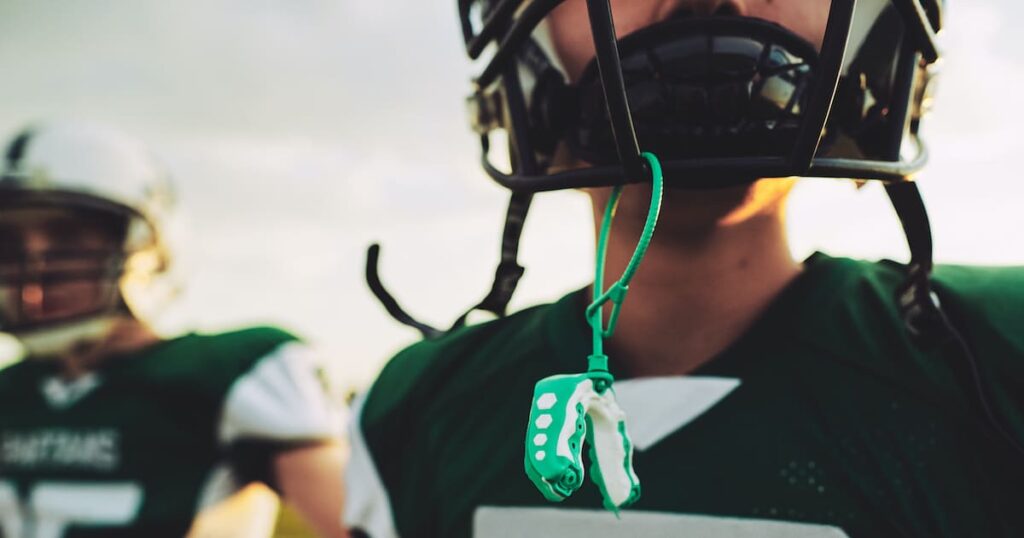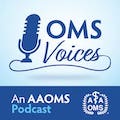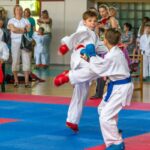Preventing Facial Injuries during Sports

Prevention is the best policy. Because avoiding injury is always best, AAOMS advocates the use of protective mouth guards and appropriate masks and helmets for everyone who participates in athletic pursuits at any level.
You don’t have to play at the professional level to sustain a serious head injury. New innovations in helmet, mouth guard and face guard technology have made these devices comfortable to wear and very effective in protecting the vulnerable maxillofacial area.

OMS Voices Preview: Preventing Facial Trauma Injuries with Face and Mouth Guards
Make sure your family is well-protected. If you play the sport, make the following safety gear part of your standard athletic equipment. Note: This list of sports is not comprehensive.
- Football
Helmets with face guards and mouth guards should be worn. - Baseball/Softball
Catchers are required to wear a mask. Batting helmets with a facemask or jaw guard are now available. Field facemasks also can be worn while fielding. - Ice Hockey
Many ice hockey players wear cage-like face guards attached to their helmets. For extra protection, both face and mouth guards — including ones with lip guards – can be worn. - Wrestling
School and collegiate athletic associations require wrestlers to wear ear guards. A strap with a chin cup holds the gear in place, protecting the ears and helps to steady the jaw. Wrestlers also should wear mouth guards. - Boxing
Mouth guards are mandatory in this sport. A new pacifier-like mouth guard for boxers has been designed with a thicker front that includes air holes to aid breathing. Head gear also is available. - Lacrosse
Hard helmets resembling field hockey helmets, with wire cage face masks, are manufactured for players of this sport. OMSs recommend that all athletes participating in lacrosse wear mouth guards. - Field Hockey
OMSs recommend that all athletes participating in field hockey wear mouth guards. Goalies can receive extra protection by wearing helmets. - Soccer
All players – goalkeepers, defenders, midfielders and forwards – should wear mouth guards. Goalies should consider head gear, and field players can wear concussion protective headbands/soft head gear for protection. - Road Cycling and Mountain Biking
All riders should wear bike helmets. - Skateboarding & Bicycle Motocross (BMX)
Skating helmets and full-face helmets are recommended protective gear for those who participate in these sports. - Skiing and Snowboarding
Due to the growing number of accidents among skiers and snowboarders, OMSs recommend that all participants wear helmets at all times to protect the maxillofacial area in the event of a fall or crash. - Horseback Riding
A horse-riding helmet and mouth guard are recommended for horseback riding, particularly if the rider is traveling cross-country or plans to jump the horse. - Basketball, Water Polo, Handball, Rugby, Karate, Judo, Mixed Martial Arts and Gymnastics
Participants in these sports should be fitted with and wear mouth guards.
A Word about Mouth Guards
New synthetic materials and advances in engineering and design have produced mouth guards that are sturdier yet lightweight enough to allow the wearer to breathe easily. Mouth guards can vary from the inexpensive “boil and bite” models to custom-fabricated guards made by dentists, which can be adapted to the sport and are generally more comfortable.
A mouth guard should be evaluated from the standpoint of retention, comfort, ability to speak and breathe, tear resistance and protection provided to the teeth, gums and lips.

There are five criteria to consider when being fitted for a mouth guard. The device should be:
- Form fitted so that it does not misalign the teeth or jaws
- Lightweight
- Strong
- Easy to clean
- The proper size to cover the upper and/or lower teeth, gums, and braces if present
By encouraging sports enthusiasts at every level of play to wear mouth guards and other protective equipment, oral and maxillofacial surgeons hope to help change the “face” of sports.


